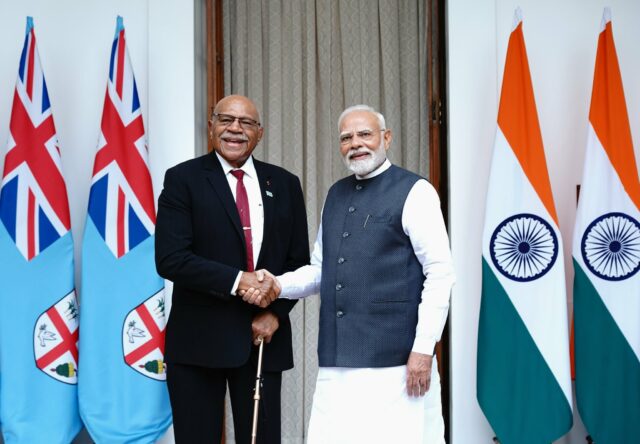Reflecting the geopolitical churn in the world and intensifying great power competition, India and Fiji have agreed to expand defence and maritime security cooperation under the MoU signed in 2017.
“We have decided to strengthen mutual cooperation in the defence and security sector,” Modi said at the end of his talks with Fiji’s Prime Minister Sitiveni Rabuka. “An action plan has been prepared for this, including training, equipment support, and maritime capacity building.”
Prime Minister Rabuka welcomed India’s support for enhancing Fiji’s maritime security, particularly for protecting its Exclusive Economic Zone (EEZ). “The protection of our EEZ is critical to our national interests,” he said.
Later, at a special briefing, Neena Malhotra, Secretary South in the Ministry of External Affairs, confirmed that an Indian naval ship will visit Suva later this year and a defence wing will start functioning from the Indian high commission. Two ambulances are also being gifted for use by the Fijian military.
A major new initiative, the Cyber Security Training Cell (CSTC), will be established in Fiji to support both nations’ growing digital and cyber defence capabilities.
The joint statement issued following the talks, highlighted shared priorities, including countering radicalization, curbing the financing of terrorism, and preventing the misuse of emerging technologies by extremist groups.
Both sides agreed to collaborate at multilateral platforms, including the United Nations, to advance global counter-terrorism efforts.
The two prime ministers condemned the April 22 Pahalgam terrorist attack and reiterated their commitment to a zero-tolerance policy toward terrorism. Both leaders opposed any form of justification or double standards in dealing with terrorism.
In a move to diversify Fiji’s economy, traditionally reliant on tourism, both sides identified agriculture as a high-potential sector for bilateral cooperation.
“India will provide 12 agricultural drones and two mobile soil testing labs to improve farming efficiency and sustainability in Fiji,” Dr Malhotra said.
“There is enormous potential in agriculture,” noted another official involved in the discussions. “Fiji has fertile land and consistent rainfall, but current agricultural output is limited. Contract farming, joint ventures, and natural farming offer major opportunities.”
India and Fiji have also agreed to explore cooperation in agro-processing, sustainable fisheries, and natural farming techniques to enhance food security and rural livelihoods.
The signing of an MoU for the Tubalevu Village GroundWater Supply Project marked a milestone as Fiji’s first Quick Impact Project (QIP), aiming to provide safe drinking water to rural communities. Originally announced at the 2024 Pacific Islands Forum in Tonga, the initiative reflects India’s broader development partnership in the Pacific.
India further committed to enhancing skill development through the Indian Technical and Economic Cooperation (ITEC) programme, offering training to Fijian government professionals in diverse sectors.
Both leaders stressed their shared vision for a free, open, inclusive, and rules-based Indo-Pacific. Future collaboration will also cover humanitarian assistance, disaster relief and technology collaboration.
“India is a co-traveller in the development of the Global South,” Modi said. “We are partners in building a world order where the independence, ideas, and identity of the Global South are respected.”
Fiji reaffirmed support for India’s bid for permanent membership in a reformed United Nations Security Council and for its 2028–29 candidature as a non-permanent member.





